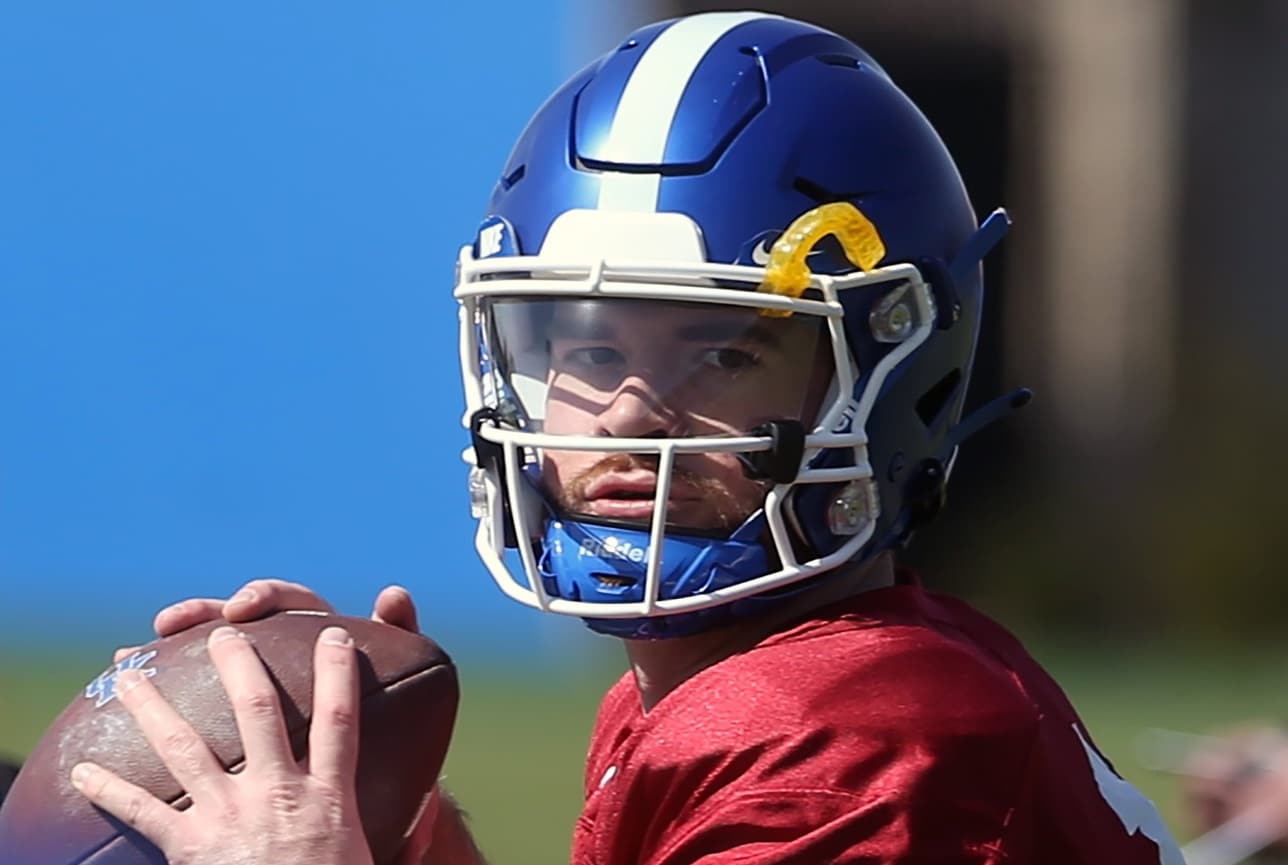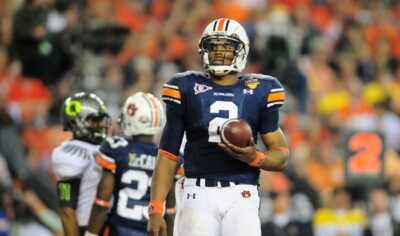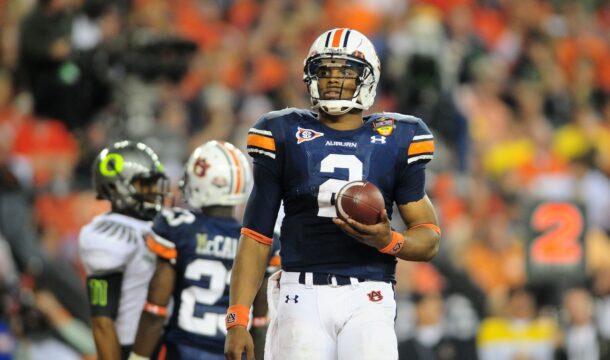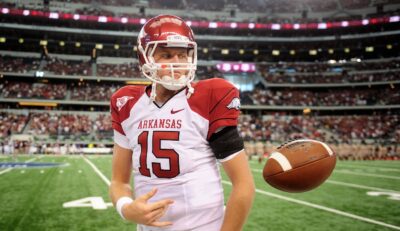
Devin Leary has been put through the ringer, and it’s why he’s poised for stardom at Kentucky
Two months before he entered the transfer portal and opted to replace Will Levis at Kentucky, Devin Leary sat with his mom in the waiting room of Dr. James Andrews’ office in Pensacola, Florida. Leary’s 2022 season was cut short at NC State after he tore his pectoral muscle taking a hit from 300-pound Florida State defensive lineman Joshua Farmer.
The 2022 ACC Preseason Player of the Year was all too familiar with injuries. In 2020, Leary suffered a torn fibula and required the famed “Tua Tightrope” procedure made famous by former Alabama star Tua Tagovailoa ahead of the 2018 College Football Playoff. That 2020 season didn’t start with an injury, but rather a COVID contact tracing-forced absence wherein Leary missed crucial time ahead of the season opener that saw him temporarily lose the starting job even though he never tested positive for the virus.
He eventually bounced back from that by becoming one of the best quarterbacks in the nation with a 35-5 TD-INT ratio at NC State in 2021, so naturally, the mindset was that the pec injury was just going to be a minor setback heading into his last and final year in 2023.
But sitting in that waiting room, Leary quickly realized that his torn pec wasn’t your standard quarterback injury.
“The first thing I hear is ‘(Andrews) has never done a pec surgery on a quarterback before,’” Leary told SDS on a recent episode of The Saturday Down South Podcast. “They told me, ‘He’s never done this before and he’s honestly not sure when I’d be able to throw again and if I’m even gonna be able to throw again the way that I used to.’ Immediately, my heart just sank.”
Devin Leary had a wild pre-surgery conversation with his doctor. @TheSDSPod @DevinLeary1 pic.twitter.com/y9jNSnSaXs
— Saturday Down South (@SatDownSouth) March 31, 2023
Andrews called around to physicians in the NFL, and at the college level. Did anybody have any experience repairing a quarterback’s torn pec? Nope. That meant Leary had a decision. Should he potentially risk his career by going through the surgery without any track record for quarterbacks, or should he just try to rehab it and hope that it improved?
Leary opted for the surgery. That meant anchors in his arm, and they attached the breastplate back to his arm.
Less than 6 months later, that potential fork in his career (and really his life) is now just another detail on his journey to Lexington.
“Here I am today just throwing the ball like nothing ever happened,” Leary said.
Ideally, Leary will shine for Kentucky like none of those injuries ever happened. Then again, maybe that’s exactly why he’s poised to succeed in his 1 year in Lexington.
He’s been dominant, he’s been unlucky and he’s been patient. But most important, Leary is still here.
By “here” that’s at Kentucky, where he’ll step into Levis’ shoes with plenty of similarities — they’re transfers who hail from the Northeast and they’re roughly 3 months apart in age — and some pretty stark differences. At 6-1, 217 pounds, Leary won’t be confused for a linebacker like Levis. There also might be a different learning curve for the new UK starter. Leary already has 944 passes at the Power 5 level, which is 206 more than Levis finished his career with after spending his first 3 years as a run-oriented backup at Penn State.
Leary entered his time in the Bluegrass State at a different point than Levis, but like his predecessor, Leary opted for Kentucky thanks in part to a pitch from new offensive coordinator Liam Coen.
Coen sold something that Leary didn’t fully get to experience with 3 different offensive coordinators at NC State: a pro-style system.
“In my opinion, there aren’t many offenses (like this one) that can get you ready for the next level,” Leary said.
(Leary did add that he was a big fan of running “4 verts” in the Tim Beck offense, which featured plenty of RPOs, up-tempo and downfield shots that were lacking with the 2 previous NC State offenses he played in … the first of which was led by Eli Drinkwitz.)
The faith in the system stems from Coen’s return. He led Kentucky to its best offense in 14 years in 2021 before becoming Sean McVay’s offensive coordinator with the LA Rams. UK’s offense fell apart under Rich Scangarello. Coen’s 2023 return brought optimism to Kentucky. It’s safe to say Leary’s arrival brought optimism to Coen, too.
“Just a natural thrower of the football. You just see the ball jump off his hands. I think he’s a very good opportunity thrower,” Coen told SDS in an interview in January. “He’s very much in the cylinder on a lot of throws that you’re looking for … when you look at his tape, you see the different body types that he was throwing to (at NC State) and I think he knows his personnel very well. He can become accurate no matter who he’s throwing to.”
The 2 began texting before Coen made the cross-country move back to Kentucky. Leary sent Coen concepts he liked with screenshots of different looks so that they were able to hit the ground running in spring camp.
The questions facing Leary aren’t so much about his skill set, the scheme or even the skill players he’ll work with (UK returned its top 3 receivers and added 1,000-yard rusher Ray Davis from Vanderbilt). It’s about the protection. No Power 5 team allowed more sacks than UK last year, which led to Levis playing through multiple injuries and missing the South Carolina game. Given Leary’s injury, it’s fair to say that a return to form for “The Big Blue Wall” is a big blue question entering 2023. But so far in spring camp, the returns have been positive.
“From what I’ve seen compared to last year,” Leary said, “it’s 10 times better.”
If that remains the case throughout the fall, all signs point to him being an even better version of the guy who broke Philip Rivers’ single-season touchdown pass record at NC State in 2021. That’s when it all clicked for Leary. Actually, he said it clicked in 2020 during that first start of the season against Pitt. All Leary did that day was become the first NC State quarterback since Russell Wilson in 2009 to throw for 330 passing yards, 4 touchdowns and 0 interceptions.
Devin Leary throws for 336 yard and 4 TDs in a NC State 30-29 upset win over #23 PITT!
?NCST +14
?NCST (+460)
?O46#1Pack1Goal pic.twitter.com/WqHstLIM9y— SportsBettingDime (@SBD) October 3, 2020
Of course, that was followed by the aforementioned fibula injury 2 weeks later. In some ways, that’s been the story of his career.
And no point, however, did Leary think he should hang up his cleats to get a head start on becoming a high school football coach. Whether a season in the Kentucky offense yields a pro future or not, he’s entering Year 6 with a unique perspective. His younger brother, Donovan, is entering his second season as a quarterback at Illinois. Big brother is trying to lead by example.
“What motivated me was, if I could get through this and overcome all this adversity, I’m just gonna prepare him this much more, to give him feedback and let him know what I’ve been through,” Leary said. “I just want to let him know, this is what comes with the sport, this is what comes with the position. You’ve got to embrace it.”
Leary admittedly took some time fully embracing the role of vocal leader in his new surroundings.
A couple of weeks ago, Kentucky players came back from spring break and returned to camp. Leary called the practices a bit “sluggish.” Mark Stoops made his feelings known.
“You could tell Coach Stoops was getting mad,” Leary said. “He holds us to a high standard. If we truly want to be great this season and accomplish the things we say, our actions on the field and our energy on the field need to reflect that, and they didn’t. That’s why he was getting pissed.”
That led to a rare public call-out from Stoops.
“I’m a little frustrated, a little disappointed, a little pissed.”
Mark Stoops wasn’t pleased with how Spring practice went today, saying some players seem ‘entitled’ and don’t want to put in the work that’s helped build the brand of Kentucky Football #BBN pic.twitter.com/2VpHVGIp9M
— Eli Gehn (@EliGehnTV) March 25, 2023
Stoops added that “we have no leaders right now … No excuse. Bulls—.”
Did Leary take that “we have no leaders right now” comment personally as the quarterback? Absolutely, but in a constructive way.
“Leaders on the team had to step up, starting with myself,” Leary said. “I needed to do a better job of speaking up and making sure that everyone was prepared for practice and everyone approached every day in a professional manner because that’s what these coaches expect from us.
“Ever since he drilled us and went hard into the media and laid it all on the line, we responded well.”
Leary’s entire career has been about responding. Whether that was bouncing back after injuries or simply showing that he deserved offers from bigger programs after rewriting the New Jersey high school record books, Leary has a knack for turning a negative into a positive.
Maybe on a micro level this season, that’ll be him turning likely sacks into on-target throws that move the chains. Kentucky needed more of that amidst last year’s 3-6 post-September record.
On a macro level, Leary was brought in to make sure that the Cats don’t drown in the increasingly competitive SEC East. Getting the program back to the 10-win level we saw in 2018 and 2021 isn’t the goal. It’s the expectation.
Time to embrace it.
Connor O'Gara is the senior national columnist for Saturday Down South. He's a member of the Football Writers Association of America. After spending his entire life living in B1G country, he moved to the South in 2015.







